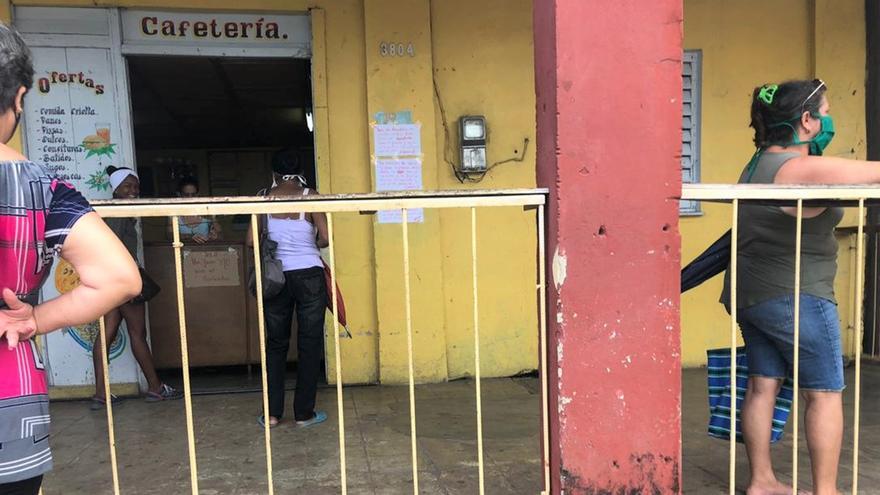
![]() 14ymedio, Bertha K. Guillén, Candalaria, December 10, 2020 — After months-long closures due to the pandemic, private businesses in Artemisa province have a new problem: the imposition of price controls on many of the foods they offer in their cafes. Provincial authorities have ordered price caps on items such as pizzas, sandwiches and peanut nougat.
14ymedio, Bertha K. Guillén, Candalaria, December 10, 2020 — After months-long closures due to the pandemic, private businesses in Artemisa province have a new problem: the imposition of price controls on many of the foods they offer in their cafes. Provincial authorities have ordered price caps on items such as pizzas, sandwiches and peanut nougat.
“In this cafe the only thing we are selling is fruit juice because we can’t afford ham for the sandwiches,” explains Abelardo, a private sector worker who, until the beginning of this year, had a thriving business in San Cristobal, with an expansive menu offering popular takeout boxes.
It was rare for us not to have steak, sautéed pork and chicken cubes, which we served with rice, a green vegetable and a salad,” recalls Abelardo. “We can’t find those products now at the market so now we aren’t selling boxes anymore.” He reworked the menu to deal with the changed circumstances and started offering sandwiches and pizzas instead. But the new items did not last long.
“The government told us we couldn’t charge more than 10 pesos for the breads that we normally served with omelet, croquettes, ham or steak,” says Abelardo. “Our hands are tied. At that price we can’t turn a profit so it isn’t worth it for us to sell them,” he explains.
Price controls are dragging down profits in a sector that has been hard hit by Covid-19 restrictions. Last May authorities reported that, throughout the country, the number of private sector workers who had let their licenses lapse* had risen in a few weeks from 139,000 to 222,723.
In mid-April 22% of self-employed workers had lost their source of income. One month later the figure had climbed to 35% of private employment license holders in pre-pandemic Cuba. The situation is most serious in small towns where, in addition to new limitations, cafes and restaurants owners must cope with supply shortages.
In the Candelaria neighborhood Tamara manages a private cafe that teeters between being shut down permanently or kept afloat by selling fruit juice until the situation improves. The price of her popular peanut nougat has been capped at 2 CUP while the ingredient costs to make it are at least 6 CUP.
Pizza, another item in high demand, is one of the products subject to price controls. Ham cannot be sold for more than 15 pesos, less the than price cafe owners say they need to charge to recover their investment costs. For example, a sack of flour comes to around 2,200 CUP, a pound of cheese goes for more than 50 and ham costs 65 at farmers markets.
The little capital most of these entrepreneurs have will not cover the cost of raw materials because the months-long closure of their businesses left them with practically no savings. The hope that they could recoup some of their losses led many to reopen as soon as the province began easing the strictest Covid-19 restrictions.
Prices for items such as the so-called frozen [in English] a light ice cream in high demand, have also been capped in Artemisa. It cannot be sold for more than 2 CUP, less than half of the 5 CUP price it normally goes for in privately owned businesses. To discourage business owners from ignoring price controls, authorities have stepped up inspections.
Inspectors not only check to ensure that the businesses are not charging more than is legally allowed, but also to verify that raw materials have been purchased through the network of state-run hard currency stores (MLC), including those that opened last July to sell food and personal hygiene products.
The measure has led to the disappearance of foreign and domestic soft drinks from privately owned cafes, which can only acquire them at stores which price goods exclusively in hard currency. As such, price controls make it impossible fo sell them for a profit.
There is never any rest for the private sector. Though many business owners have made desperate pleas for a rescue package that includes preferential credit, no such economic lifeline has been provided. The government has only offered them jobs in the public sector, postponement of their license fees and the option to temporarily suspend their work permits.
*Translator’s note: Cubans with self-employment licenses pay monthly fees simply to have the license, plus additional taxes on their earnings.
____________
COLLABORATE WITH OUR WORK: The 14ymedio team is committed to practicing serious journalism that reflects Cuba’s reality in all its depth. Thank you for joining us on this long journey. We invite you to continue supporting us by becoming a member of 14ymedio now. Together we can continue transforming journalism in Cuba.
